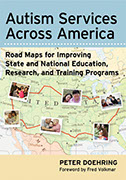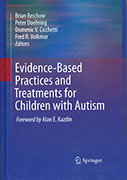Behavior Support
Students with autism can present with behaviors that are dangerous, complex, and/or difficult to change. It can therefore be very challenging to ensure that behavior support is effective yet minimally intrusive, and that the behavior support helps the student succeed in the setting that is the most appropriate yet least restrictive. I was responsible for oversight of behavior support at DAP. I revised and expanded the mandate, functioning and statewide oversight of DAP's independent Peer Review Committee (PRC), and ensured that it provided regular oversight statewide to all eligible students.
All of the activities described below are conducted under the direction of the Statewide Director, with the support of the school district hosting the Statewide Program, and the State Education Agency through a formal inter-agency agreement. These efforts contributed to extremely low rates of hospitalization and residential placement for students in DAP (Doehring and Winterling, 2011, 2013).
Key Elements
Standards for behavior support
In addition to the intensive staffing support provided throughout DAP, I formalized standards for Behavior support to promote timely development and progress monitoring of behavior plans based on a functional behavioral assessment and promoting positive and proactive interventions (Doehring and Winterling, 2011, 2013). This included the development of a series of specific triggers for PRC review, and careful tracking of changes in the types of recommendations made.
Training and technical assistance
I developed and implemented comprehensive, grant-funded programs of training and technical assistance in Behavior support for DAP Psychologists and Behavior analysts statewide. Training included independent experts, case presentations, written standards, reviews of peer-reviewed research, and templates for critical documents. More than 25 staff members completed 18 hours of initial training, and 7-14 hours of annual updates between 2004 and 2008, and some subsequently presented relevant findings at a national conference. In addition, these behavior standards were incorporated into training provided to more than 65 teachers as part of master-level accreditation in ASD (described elsewhere), and presentations provided to more than 300 other staff and parents statewide as part of day-long workshops in ASD. This program of training was partially supported by grant from the state Department of Education.
Independent Peer Review
I also provided oversight through direct coaching and formalized and implemented comprehensive mechanisms of independent peer review to ensure compliance with these standards (Doehring and Winterling, 2011, 2013). I ensured that it provided regular oversight statewide to all eligible students. This included the development of a series of specific triggers for PRC review, and careful tracking of changes in the types of recommendations made. I also led the development of inter-agency agreements to share responsibility for the funding and oversight of these programs between local and state education agencies.
Related Content
On this site
My Presentations and Publications
 With Vince Wintering. (2013). Delaware Autism Program: Statewide Educational Services in the Public Schools. In Autism Services Across America: Roadmaps for Improving State and National Education, Research, and Training Programs. Paul H. Brookes Publishing Co., Baltimore, MD
With Vince Wintering. (2013). Delaware Autism Program: Statewide Educational Services in the Public Schools. In Autism Services Across America: Roadmaps for Improving State and National Education, Research, and Training Programs. Paul H. Brookes Publishing Co., Baltimore, MD
 With Vince Wintering. (2011). The Implementation of Evidence-Based Practices in the Public Schools. In Evidence-Based Practices and Treatments for Children with Autism. (2011). Springer-Verlaug, New York, NY.
With Vince Wintering. (2011). The Implementation of Evidence-Based Practices in the Public Schools. In Evidence-Based Practices and Treatments for Children with Autism. (2011). Springer-Verlaug, New York, NY.
 (2008). A model for regional training and service delivery for children with autism. International Society for Autism Research. London, UK.
(2008). A model for regional training and service delivery for children with autism. International Society for Autism Research. London, UK.
 (2006). Independent peer review of behavior plans for students with autism in a specialized public school program. Association for Behavior Analysis. Atlanta GA.
(2006). Independent peer review of behavior plans for students with autism in a specialized public school program. Association for Behavior Analysis. Atlanta GA.
 (2004). Peer review of behavior support plans for individuals with autism. National Association of School Psychologists, Dallas, TX.
(2004). Peer review of behavior support plans for individuals with autism. National Association of School Psychologists, Dallas, TX.
X
 Improving and expanding services in a coordinated and sustainable way requires time, careful planning, expertise, and leadership
Improving and expanding services in a coordinated and sustainable way requires time, careful planning, expertise, and leadership
Together with the coordinated efforts to improve ASD Identification and Extended Services, the improvements to Behavior Support illustrated the many important steps involved in successful program development that results in sustainable changes in services. Many consultants (and especially those without experience leading programs of services) will rely on isolated training activities, perhaps accompanied by a plan that includes several recommendations for program changes.
The Behavior Support initiative illustrated other critical components also described in my Roadmaps book (Doehring, 2013): the development of specific, written practice standards driven by the best available research; training that includes technical assistance and that also helps to develop expertise within the program; mechanisms that build in oversight, including the ability to track progress towards program goals; a review of relevant policy changes; parallel changes to adjust staffing support as needed; opportunities to integrate the observations of independent experts, and; utilization of opportunities to obtain external funding. These components were not all implemented at the same time, but over a period of 3-4 years, and only after a preliminary phase in which stakeholders helped to identify specific areas of need and opportunity.
Current vita